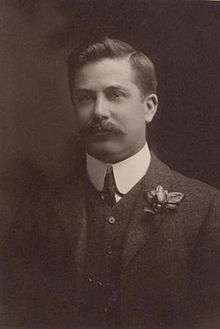James Catts
James Howard Catts (12 August 1877 – 26 November 1951) was an Australian politician, unionist and businessman.[1]
James Catts | |
|---|---|
 | |
| Member of the Australian Parliament for Cook | |
| In office 12 December 1906 – 16 December 1922 | |
| Preceded by | New seat |
| Succeeded by | Edward Riley |
| Personal details | |
| Born | 12 August 1877 Wagga Wagga, New South Wales |
| Died | 26 November 1951 (aged 74) Huntleys Point, New South Wales |
| Nationality | Australian |
| Political party | Labor (1906–22) MLP (1922) |
| Spouse(s) | 1) Eva Alice Weber (divorced 1920) 2) Dorothy Marguerite Purcell |
| Occupation | Unionist |
Early life
Catts was born at Wagga Wagga, New South Wales to joiner and grocer James Catts and Amy, née Hedger. He lived with his paternal grandfather at Stanmore as a child, being educated until the age of 13 at Macdonaldtown Public School.
In 1894 the Catts family began a bakery in Forbes, which young James helped to run. At the age of 17, he became the secretary of the Farmers and Settlers' and the Progress associations at Forbes, and was general secretary of the United Progress Association of New South wales from 1900–03. He was also organising secretary of the New South Wales Temperance Alliance, and held other prominent positions in railway unions. From 1913-14 he became general secretary of the Australian Union Federation and president of the Australasian Labour Federation, and founded the United Secretaries' Association in 1915.
Politics
Catts's first attempt to enter politics was unsuccessful, running in the 1904 state election as the Labor candidate for Granville. He became the youngest member of the Australian House of Representatives in 1906 when he was elected to the seat of Cook at the age of 28, and became associated with King O'Malley and Billy Hughes. He became known as a protectionist and nationalist in Parliament. In Sydney on 12 August 1907, he married Eva Alice Weber; they were divorced in 1920.
On 18 August 1910, Catts was suspended from the House of Representatives for one day, the first member to be suspended. This was because he referred to a statement by Elliot Johnson as "a dirty, skunky thing to say", and also referred to members opposite as "you dirty skunks".[2] Catts was director of the Federal and State Labor campaigns in New South Wales from 1914 to 1922. He was also the director of voluntary recruiting in New South Wales 1915–16, producing the weekly magazine Call to Arms.[3] He was also an opponent of communism and conscription, and was prosecuted for asserting that Japan hoped to annexe Australia. He married for the second time on 8 September 1920, again at Sydney, Dorothy Marguerite Purcell.
Catts was expelled from the Labor Party in 1922 having been accused of sectarianism, and unsuccessfully ran at the elections for the Majority Labor Party.
Later life
Catts continued to be active in the Labor Party, running unsuccessfully as the Federal Labor candidate for Martin in 1931. He was opposed to the Lang Labor Party, but unsuccessfully ran in East Sydney in 1940 as a United Australia Party candidate. In 1944, he failed to be elected to Sydney Municipal Council, and subsequently retired.
In his retirement, Catts became secretary and treasurer of the New South Wales branch of the British Astronomical Association, devoting more time to his hobby of astronomy. He died on 26 November 1951 at Huntleys Point, and was survived by his second wife, their son and three daughters.
References
- "Catts, J. H. (James Howard) (1878-1951) - People and organisations". Trove.
- corporateName=Commonwealth Parliament; address=Parliament House, Canberra. "Selected political records of the Commonwealth Parliament". www.aph.gov.au.
- Stanley, Peter (29 August 2017). "The Crying Years: Australia's Great War". National Library of Australia – via Google Books.
- Hoyle, Arthur (1979). "Catts, James Howard". Australian Dictionary of Biography. Melbourne University Press. ISSN 1833-7538. Retrieved 16 March 2008 – via National Centre of Biography, Australian National University.
| Parliament of Australia | ||
|---|---|---|
| Preceded by new seat |
Member for Cook 1906-1922 |
Succeeded by Edward Riley |